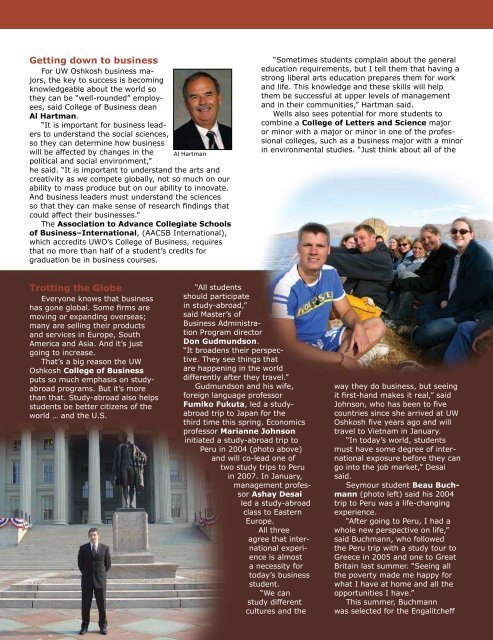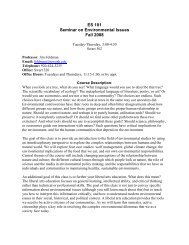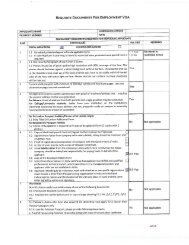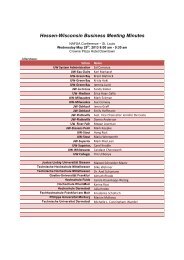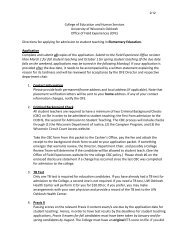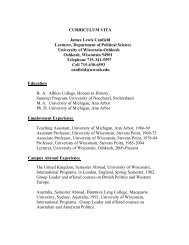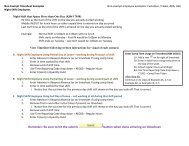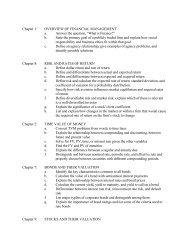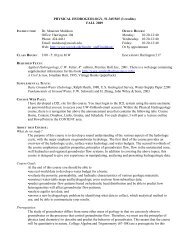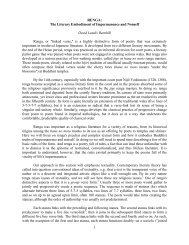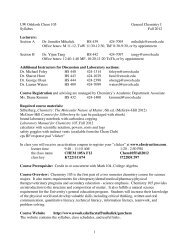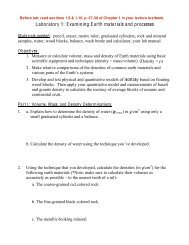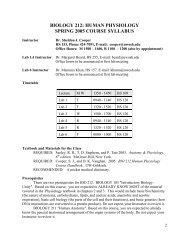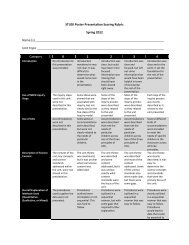Fall 06 (pdf) - University of Wisconsin Oshkosh
Fall 06 (pdf) - University of Wisconsin Oshkosh
Fall 06 (pdf) - University of Wisconsin Oshkosh
Create successful ePaper yourself
Turn your PDF publications into a flip-book with our unique Google optimized e-Paper software.
Getting down to business<br />
For UW <strong>Oshkosh</strong> business majors,<br />
the key to success is becoming<br />
knowledgeable about the world so<br />
they can be “well-rounded” employees,<br />
said College <strong>of</strong> Business dean<br />
Al Hartman.<br />
“It is important for business leaders<br />
to understand the social sciences,<br />
so they can determine how business<br />
will be affected by changes in the Al Hartman<br />
political and social environment,”<br />
he said. “It is important to understand the arts and<br />
creativity as we compete globally, not so much on our<br />
ability to mass produce but on our ability to innovate.<br />
And business leaders must understand the sciences<br />
so that they can make sense <strong>of</strong> research findings that<br />
could affect their businesses.”<br />
The Association to Advance Collegiate Schools<br />
<strong>of</strong> Business–International, (AACSB International),<br />
which accredits UWO’s College <strong>of</strong> Business, requires<br />
that no more than half <strong>of</strong> a student’s credits for<br />
graduation be in business courses.<br />
Trotting the Globe<br />
Everyone knows that business<br />
has gone global. Some firms are<br />
moving or expanding overseas;<br />
many are selling their products<br />
and services in Europe, South<br />
America and Asia. And it’s just<br />
going to increase.<br />
That’s a big reason the UW<br />
<strong>Oshkosh</strong> College <strong>of</strong> Business<br />
puts so much emphasis on studyabroad<br />
programs. But it’s more<br />
than that. Study-abroad also helps<br />
students be better citizens <strong>of</strong> the<br />
world … and the U.S.<br />
“All students<br />
should participate<br />
in study-abroad,”<br />
said Master’s <strong>of</strong><br />
Business Administration<br />
Program director<br />
Don Gudmundson.<br />
“It broadens their perspective.<br />
They see things that<br />
are happening in the world<br />
differently after they travel.”<br />
Gudmundson and his wife,<br />
foreign language pr<strong>of</strong>essor<br />
Fumiko Fukuta, led a study-<br />
abroad trip to Japan for the<br />
third time this spring. Economics<br />
pr<strong>of</strong>essor Marianne Johnson<br />
initiated a study-abroad trip to<br />
Peru in 2004 (photo above)<br />
and will co-lead one <strong>of</strong><br />
two study trips to Peru<br />
in 2007. In January,<br />
management pr<strong>of</strong>essor<br />
Ashay Desai<br />
led a study-abroad<br />
class to Eastern<br />
Europe.<br />
All three<br />
agree that internationalexperience<br />
is almost<br />
a necessity for<br />
today’s business<br />
student.<br />
“We can<br />
study different<br />
cultures and the<br />
“Sometimes students complain about the general<br />
education requirements, but I tell them that having a<br />
strong liberal arts education prepares them for work<br />
and life. This knowledge and these skills will help<br />
them be successful at upper levels <strong>of</strong> management<br />
and in their communities,” Hartman said.<br />
Wells also sees potential for more students to<br />
combine a College <strong>of</strong> Letters and Science major<br />
or minor with a major or minor in one <strong>of</strong> the pr<strong>of</strong>essional<br />
colleges, such as a business major with a minor<br />
in environmental studies. “Just think about all <strong>of</strong> the<br />
way they do business, but seeing<br />
it first-hand makes it real,” said<br />
Johnson, who has been to five<br />
countries since she arrived at UW<br />
<strong>Oshkosh</strong> five years ago and will<br />
travel to Vietnam in January.<br />
“In today’s world, students<br />
must have some degree <strong>of</strong> international<br />
exposure before they can<br />
go into the job market,” Desai<br />
said.<br />
Seymour student Beau Buchmann<br />
(photo left) said his 2004<br />
trip to Peru was a life-changing<br />
experience.<br />
“After going to Peru, I had a<br />
whole new perspective on life,”<br />
said Buchmann, who followed<br />
the Peru trip with a study tour to<br />
Greece in 2005 and one to Great<br />
Britain last summer. “Seeing all<br />
the poverty made me happy for<br />
what I have at home and all the<br />
opportunities I have.”<br />
This summer, Buchmann<br />
was selected for the Engalitcheff<br />
issues surrounding the environment that impact<br />
businesses,” he said.<br />
Last April, the College <strong>of</strong> Business teamed with<br />
the <strong>Wisconsin</strong> Green Building Alliance to <strong>of</strong>fer<br />
a symposium to explore the “myths, realities and<br />
promise” <strong>of</strong> using sustainable building practices in<br />
a new UW <strong>Oshkosh</strong> academic building, planned for<br />
construction in 2007.<br />
Besides “going green,” UW <strong>Oshkosh</strong> business<br />
graduate students will soon have the option <strong>of</strong><br />
going global.<br />
“In a day and age when global business is<br />
converging and the world is emerging as a<br />
single large market for products and services,<br />
it has become increasingly impor-<br />
tant for business organizations to be<br />
equipped with strategies and employees<br />
qualified to tackle global markets and<br />
cultures,” Hartman said.<br />
To prepare students for this everchanging<br />
environment, the College<br />
<strong>of</strong> Business will begin a Global<br />
Institute on Comparative Political<br />
and Economic Systems at<br />
Georgetown <strong>University</strong>. He’s<br />
also working as an intern at the<br />
U.S. Treasury Department.<br />
“I really like UW <strong>Oshkosh</strong><br />
because <strong>of</strong> the econ faculty, but<br />
there is not much diversity on<br />
campus,” Buchmann said. “Also,<br />
you learn a lot about yourself<br />
when you study abroad because<br />
you are constantly outside your<br />
comfort zone.”<br />
Melissa Cousineau <strong>of</strong><br />
Combined Locks, senior manager<br />
<strong>of</strong> dedicated operations at<br />
Schneider National and an MBA<br />
student at UW <strong>Oshkosh</strong>, went to<br />
Munich, Germany, and Prague,<br />
Czech Republic, with Desai’s<br />
group in January. She had previously<br />
spent several months <strong>of</strong><br />
study-abroad in Mexico.<br />
After 10 years <strong>of</strong> varied<br />
business experience, Cousineau<br />
said she was beginning to feel<br />
confident she knew how things<br />
worked in business. But things<br />
work differently in other countries.<br />
In Munich, for example,<br />
assembly-line workers are allowed<br />
one beer per shift.<br />
“To continue to be a successful<br />
nation, understanding<br />
the importance <strong>of</strong> values and<br />
cultures is important,” she said.<br />
“Those individuals and compa-<br />
nies who truly understand and<br />
respect the details will distinguish<br />
themselves with success.”<br />
Cousineau said Schneider<br />
has opened an <strong>of</strong>fice in the<br />
Czech Republic.<br />
“Touring the businesses<br />
there was an invaluable experience,”<br />
she said. “My one-week<br />
snapshot showed me that<br />
country is full <strong>of</strong> people who are<br />
highly skilled and eager to work<br />
and grow.”<br />
Faculty members who led<br />
the business study trips saw<br />
their students grow in confidence<br />
shortly after they landed<br />
in the countries they visited.<br />
“For some, it was their first<br />
plane trip,” Gudmundson said.<br />
“The first days were mind-<br />
bending. But as time went on<br />
and we visited various businesses<br />
and cultural venues,<br />
they began to overcome their<br />
Master’s <strong>of</strong> Business Administration Program<br />
in August 2007, in collaboration with universities in<br />
Germany and India. Thirty students—10 from each<br />
country—will take courses together and participate<br />
in mixed discussion groups. They also will meet<br />
three times for two weeks each–once in each <strong>of</strong> the<br />
three countries.<br />
Marketing major Amy<br />
Schmidt in the library.<br />
inhibitions about meeting different<br />
people and being among<br />
people who live differently than<br />
they do.”<br />
Eastern Europe is a potential<br />
market <strong>of</strong> the future<br />
for American business, as the<br />
region catches up to the more<br />
advanced countries <strong>of</strong> Western<br />
Europe<br />
In Prague, Desai’s students<br />
visited a McDonalds and learned<br />
from the local franchisee how<br />
McDonalds is trying to penetrate<br />
the urban market in the<br />
Czech Republic.<br />
“They’re establishing modern,<br />
upscale restaurants, because<br />
people there do not like<br />
fast food,” he said. “It was like<br />
a three-star restaurant! There<br />
were waiters. They <strong>of</strong>fered beer.<br />
So far, it’s working for them.”<br />
—Frank Church<br />
page 13


